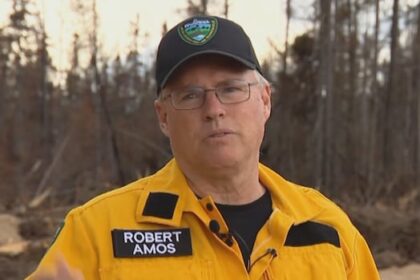Nova Scotia·NewAs a massive wildfire continues to burn in Annapolis County, some Nova Scotians have opened their doors to pets and livestock displaced by the blaze.SPCA is taking in pets, while farmers are transporting and housing livestockCassidy Chisholm · CBC News · Posted: Aug 27, 2025 1:08 PM EDT | Last Updated: 1 hour agoThe Nova Scotia SPCA in Kings County is offering space to pets whose families have been displaced by the Long Lake wildfire. (iStock/Chen Dongshan)As a massive wildfire continues to burn in Annapolis County, some Nova Scotians have opened their doors to pets and livestock displaced by the blaze.On Wednesday, officials said the out-of-control Long Lake wildfire was estimated to be about 8,278 hectares. About 500 civic addresses in the West Dalhousie area had been evacuated as of Tuesday.Tim Donald and his wife were among the new evacuees after the fire grew on Sunday. They own a hobby farm in New Albany and their biggest concern was their livestock — two horses, about a dozen turkeys and some chickens.Donald said he needed help evacuating his animals so a firefighter suggested he check Facebook. He called the first person he saw online offering help.”He was so helpful in reassuring me and taking a weight off your mind,” Donald told CBC Radio’s Information Morning Cape Breton.”He was at our house and had our animals loaded up and gone within a half an hour. That was really good.”Tim Donald, who was evacuated from his home in New Albany, N.S., on Sunday, is shown at the evacuation centre at the Nova Scotia Community College in Middleton, N.S. (Jeorge Sadi/CBC)Devon Saxby, who owns a hobby farm in Enfield, had been seeing similar exchanges on Facebook, but the information was scattered.So she decided to create a Facebook group to connect farmers across the province. It now has more than 1,200 members, many of whom have been offering their time, space and resources to rescue and house livestock.She said the group has enabled people to create evacuation plans in case the fire continues to grow.”A lot of people have become each other’s safe point so ‘I’m going to call you in case of an emergency and you’re going to call me in case of an emergency,'” Saxby told Information Morning.”So I think everyone’s thought out their plans and have arrangements made so that it’s just one click of a phone call when the time comes.”SPCA helping with petsMeanwhile, the Nova Scotia SPCA has been taking in displaced pets.Spokesperson Sarah Lyon said their Kings County shelter in Waterville is offering space for pets while families sort out where they’ll be staying during the evacuation.Lyon said so far, one family has brought their cats to the shelter.She said anyone who needs a place to take their pets can contact the Kings shelter at 902-220-9070.”If you have your pet and you can’t make it to the Kings shelter, please still give us a call so we can work with some of our partners. We are still here to help,” she told Information Morning.Lyon said owners should have their pet’s collar and a list of medications with them.”Don’t worry about food, don’t worry about toys, don’t worry about beds, don’t worry about blankets. We have all of that here. Just get out safely,” she said.An aerial view of a dozer break at the Long Lake wildfire in Annapolis County, N.S., from Saturday, Aug. 23, 2025. (Province of Nova Scotia)She said if people can’t get to their pet during an evacuation, they should shut the door to the room they are in, leave a note if there’s time and tell first responders that a pet is inside.”It makes it easier for somebody — whether it’s that first responder, whether it’s the SPCA responding — it makes it easier for them to come in and safely retrieve your animal,” she said.Lyon also recommended that people in the area make a plan for their pets before they have to be evacuated.That means having a good-sized carrier or kennel with blankets, some food, medication and other necessities packed and ready to go, she said. Comfort toys and treats are also good to have on hand.She said in times of emergency, people should have a photo of their pet on their phone, ensure they are wearing their collar and make sure their microchip information is up to date. “We know that during evacuations, depending on how much time you have, you are in and out of the house, your pet could get lost, they could run out because it is a very confusing and emotional time,” she said.”So they might feel that energy and get out. So you want to make sure that you have all of those things in place before you evacuate.”ABOUT THE AUTHORCassidy Chisholm is a digital reporter and associate producer with CBC Nova Scotia. Get in touch with her by emailing cassidy.chisholm@cbc.ca. With files from Steve Sutherland, Erin MacInnis
Nova Scotians open their doors to animals displaced by Annapolis County wildfire











